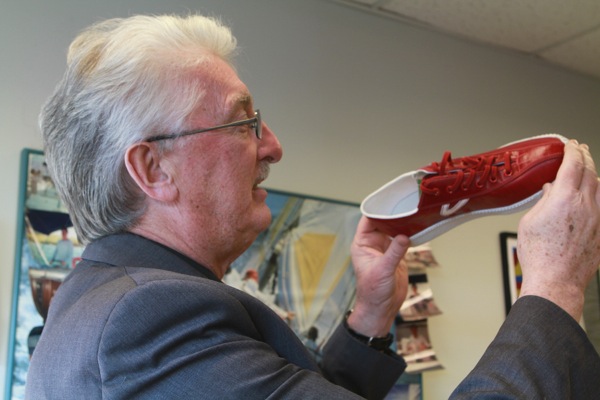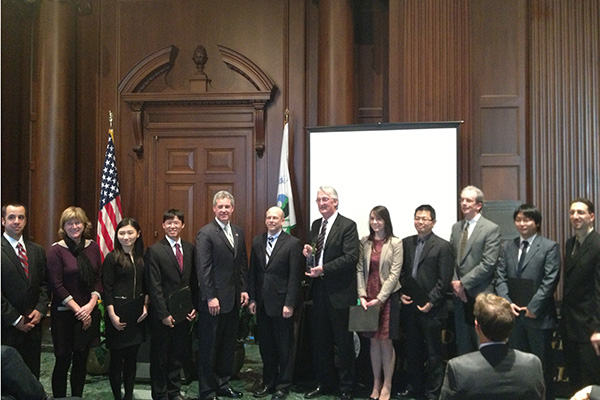Green innovator
UD's Wool wins Presidential Green Chemistry Challenge Award
2:03 p.m., Dec. 11, 2013--The Environmental Protection Agency has honored the University of Delaware’s Richard Wool with its Presidential Green Chemistry Challenge Award for his extensive work developing bio-based materials to support the green energy infrastructure.
Wool was recognized today during a presentation at EPA headquarters in Washington, D.C.
Honors Stories
National Medal of Science
Warren Award
Now in its 18th year, the EPA awards program recognizes the design of safer and more sustainable chemicals, processes and products. Awards are conferred annually in five categories: Academic, Small Business, Greener Synthetic Pathways, Greener Reaction Conditions and Designing Greener Chemicals.
Wool, UD professor of chemical and biomolecular engineering and director of the Affordable Composites from Renewable Resources (ACRES) program, is a world leader in developing safer chemical substances from renewable resources through processes that require less water and energy, and produce less hazardous waste compared to petroleum-based processes.
The products can be used as adhesives, composites and foams — even circuit boards, hurricane resistant energy efficient roofs and leather substitutes.
“Finding low toxicity replacements for commodity plastics such as polystyrene and PVC, adhesives, foams and composite resins, in addition to leather-like materials, must be a priority if we are to benefit the environment and human health,” said Wool.
Wool became passionate about sustainability in the early 1990s when he served as chairman of the American Society for Testing and Materials committee for biodegradable plastics. The committee included representatives from the farming community, state governments and major corporations, as well as environmentalists and members of the academic community.
“I became critically aware of the issues surrounding waste management, recycling, climate change and the protection of our natural resources,” he said. “I began to wonder if there was a better way.”
This motivated Wool to incorporate green chemistry and green engineering solutions into his research. He created several high-performance materials using biobased feedstocks, including vegetable oils, lignin, chicken feathers and flax. He developed hurricane resistant roofing with colleagues in UD’s civil and environmental engineering department in response to issues in global warming. He has also signed a memorandum of understanding (MOU) with the South African government to further its development of biobased township housing using ACRES inventions.
In 2012, Dixie Chemical began producing Wool’s bio-based composite resins for a worldwide market. His discoveries have led to the development of soy-based composites used in boats, tractor panels and wind turbine parts.
One of Wool’s more recent inventions is a breathable, bio-based eco-leather that avoids the traditional leather tanning process. This environmentally-friendly product, developed as a collaboration between researchers in Wool’s ACRES group and colleagues in UD’s fashion and apparel studies department, has resulted in collaborations with well-known companies such as Nike, Puma and others to use the leather substitute in their products. He shares a patent with Nike on the development of its new environmentally friendly air bubbles for athletic shoe wear.
“Ten years ago, green chemistry and engineering was a novel concept, but today, we are reaching a critical mass of individuals focused on sustainability and the environment,” said Wool. “This award lends credibility to what we are doing, and my hope is that it will cause some to give us a second look.”
Current and former students and colleagues in the ACRES group who contributed to Wool’s green research will also be recognized during the ceremony.
About the professor
Richard Wool, who joined the UD faculty in 1994, is a professor of chemical and biomolecular engineering and director of UD’s Affordable Composites from Renewable Resources (ACRES) program. He directed UD’s Center for Composite Materials from 1994-96.
A fellow of the American Physical Society, Division of Polymer Physics and chair of the Gordon Research Conference on Composites, Wool’s research has been funded by the Department of Defense, Department of Energy, Environmental Protection Agency, National Science Foundation, U.S. Army Research Laboratory and U.S. Department of Agriculture.
He is the author of two books, Bio-Based Polymers and Composites, with X.S. Sun, and Polymer Interfaces: Structure and Strength, and holds five seminal patents in the biobased materials field.
His research has been highlighted in The New York Times, Science Times, Chemical & Engineering News, the Public Broadcasting Service series NOVA and the Sundance Channel’s documentary Gadgets.
Previous career honors include the American Chemical Society’s Affordable Green Chemistry Award in 2011 and the Bio-Environmental Polymer Society’s Lifetime Achievement Award in 2012.
Article by Karen B. Roberts












